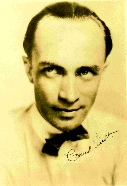
The Conrad Veidt Society
TIMES GROUP NEWSPAPER
March 26, 1998
FAN FINDS RESTING PLACE FOR FILM HERO'S ASHES
When Vivienne Phillips was a teenager she fell in love with a movie star called Conrad Veidt.
Now, 55 years after his death, and by a bizarre set of coincidences, the pensioner from Hendon has become responsible for finding him a final resting place in Golders Green Crematorium.
Conrad Veidt made his name playing alongside screen greats like Humphrey Bogart in Casablanca and Joan Crawford in A Woman's Face. His sudden death while playing golf in 1943 shocked the film world, and Vivienne, having just dumped Errol Flynn, was devastated.
''When his wife died in 1980 she willed all her belongings, including Conrad's ashes, to a nephew in California. A biographer got in touch with the nephew and asked if he could have a look and that's when the ashes were discovered,'' Vivienne explained.
From that moment on, Vivienne,now 71, began a collection which is thought to be the largest in Britain. The most significant development, however, came ten years ago when she discovered the Conrad Veidt Society, and with it Conrad's remains.
Last year the Society issued a plea to fans saying the ashes needed a permanent home. Vivienne wrote back suggesting Golders Green Crematorium. The Society loved the idea and the placement will take place next Friday.
For Vivienne, it's a wish come true. ''When I learnt his ashes were stuck in a basement, I thought it was appalling. I must say I'm rather chuffed. He will now be with people he starred with such as Vivien Leigh and his friend, Sir Alexander Korda.''
For more information on Conrad Veidt tap into the Net at: http://members.aol.com/CVSociety/home.html
(Photo not reproduced here: Conrad Veidt and Joan Crawford in A Woman's Face
THE GUARDIAN
Friday April 3 1998
The man best remembered as the Nazi villain in Casablanca was, in real life, blacklisted by Hitler. Even stranger, 50 years after his death, his ashes are being laid to rest in Golders Green. Claire Armistead on the rise and fall of Conrad Veidt.
A handful of people will today gather at Golders Green Cemetery to inter an urnful
of ashes. Nothing strange in that -
Veidt -
It's typical of his story that the Conrad Veidt society was only set up eight years
ago -
The Rathlesbergers became fascinated in Veidt after seeing him on television in Dark Journey, with Vivien Leigh. Rathlesberger, who claims not to be a movie buff, recalls his first encounter with Veidt like a teenager reliving love at first sight. ''There's that great scene when he's slapped across the face, and his face changes from pain to shock to recovery and his monocle stays in place without its ribbon. We were attracted because of his suave sophistication and his elegance,'' he says. ''Now we value his courage and integrity. As a civil servant, I see lots of people making compromises they shouldn't. These are small things. Veidt wouldn't compromise, even over big things.''
Connie Comes Home